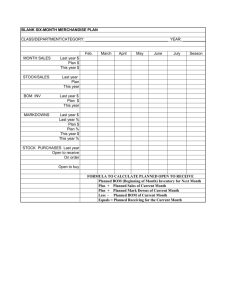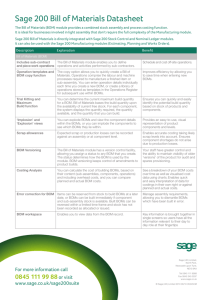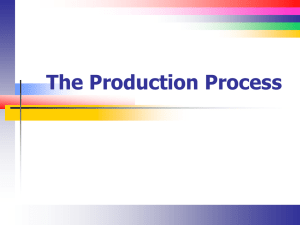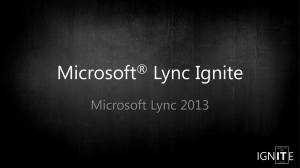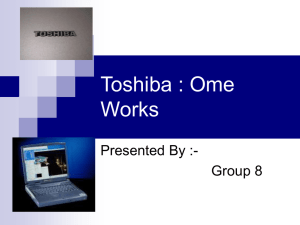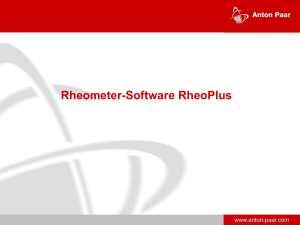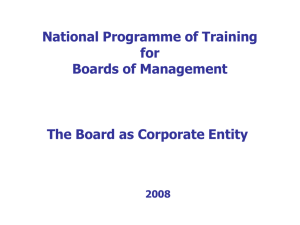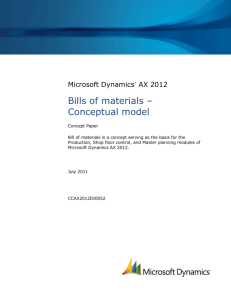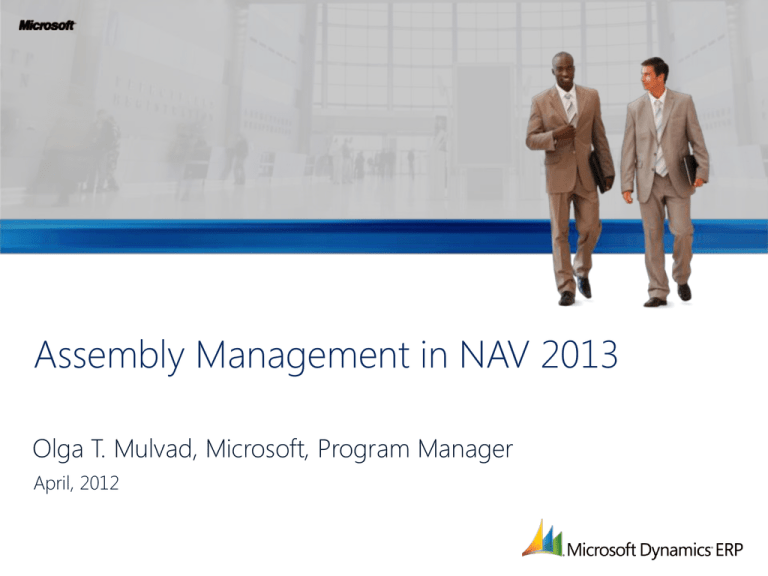
Assembly Management in NAV 2013
Olga T. Mulvad, Microsoft, Program Manager
April, 2012
In this Session
Assembly Management – new feature
‒ What is it about?
‒ Who is it for?
‒ Why is it useful?
Demos - highlights of design and functionality
Kitting (NA/FR/APAC) versus Assembly
Assembly Management
Overview
Assembly – define it
Many things to different companies/industries
Final assembly, light assembly, kitting, pick-to-order,
configure-to-order, light manufacturing
Assembly &
Assembly
Kitting
ItemKitting
Grouping
• Combine raw materials to create a finished good
• Combine finished goods into an end-item
• An assembly item is a physical item, that is built from
components and put/withdrawn from stock as an item
number.
• Combine already finished (produced or purchased) goods into a
group
• A group item is not a real item, but a convenient way to move a
set of different goods through the sales process. It does not exist
physically on stock and hence does not have a balance on hand.
Assembly- what’s the attraction?
Is an attractive inventory stocking strategy due to:
Inventory
Reduction
• Customization (like special labeling and packaging), assembling
and ”putting together” can be postponed until after the
customer order is received, and/or common components have
left the production plant
• Sellable items are stocked in a generic state as long as possible
while ”item sets” are not stocked at all
Customer
Service
• Last minute customer requirements can be accommodated
• Pre-assembled promotional kits can be shipped out quickly
• Special price options and services can be offered through a ”kit”
Assembly Business
This is what you store in your warehouse:
Spools
of
Cables
Connectors
Assembly Business
This is what you sell to your customers:
... and you don’t want to store those end-items in your warehouse, because:
1.
The same components are used in different products
2.
You don’t know what product configuration your customers will order
3.
You will have excess inventory (inventory=
)
Who shall be interested?
Any business with simple ”conversion” processes ...
that don’t require complex setup and maintenance …
and may resist investing in more resource-demanding
production modules …
Customers for Assembly
Light manufacturers, wholesalers and retailers, whose:
"production process" a part of regular warehouse operations
work/labour involved in producing a final assembly is relatively
short and consists of very few simple operations
manage the conversion process through one-entry-point interface,
with minimum setup effort, by employees with no university degrees
in production engineering, and for affordable price
Non-Customers for Assembly
Manufacturers who operate with:
multi-stage production processes
with specialized activities at each work operation, long
production lead times that result in WIP
versions of BOMs
have a need for capacity load optimization and control
Assembly Management
Functional demos
Assembly Design
Assembly
BOM
Supply
Planning
Availability
thru BOM
Assemb
Assembly
lyItem
Item
Assembly
Policy:
ATS or
ATO
Replenish.
Policy:
Assembly
Warehouse
Assembl
Assembly
Order
y Order
Undo
Costing
Costing
Reservations
Serialization
Assemble-toOrder
Assembly Item
Assembly BOM
Replenishment Policy: Assembly
Assembly Policy:
‒ Assemble-to-Stock
‒ Assemble-to-Order
Roll-up standard cost across Assembly and
Production BOMs
Price roll-up on demand
Assemb
ly Item
Assembly Order
Design foundation for:
‒ Assemble-to-Stock
‒ Assemble-to-Order
Seamless integration to inventory, planning and
warehouse
Flexibility
Posting through order management (instead of
journals)
Historic record of posted assembly order
Assembl
y Order
Assembly Costing
New Item Ledger Entry Types:
‒ Assembly Consumption
‒ Assembly Output
No WIP
Capacity Ledger Entries for resources
Standard Cost Worksheet
Costin
g
Assembly Design
Assembly
BOM
Supply
Planning
Availability
Availability
thru BOM
BOM
thru
Assembly
Item
Assembly
Policy:
ATS or
ATO
Warehouse
Replenish.
Policy:
Assembly
Assembly
Order
AssembleAssemble-toOrder
to-Order
Undo
Undo
Costing
Reservatio
ns
Reservations
Serialization
Serializatio
n
Assembly-to-Order
Based on Assemble-to-Order policy:
Assembl
e-toOrder
- automatic creation of reserved
Assembly Order linked to sales line
-
automatic synchronization of changes
Mixed scenarios (inventory + assemble-to-order)
Sales quotes & blanket orders (no invoices)
Can be potentially used on other orders
Assembly – Availability
Stockout warning for Able to Assemble
Able to Make view through entire BOM
Valid for Production BOMs
Full inventory availability integration
Availabilit
y
Reservations and Item Tracking
Reservations for components and
assembly items
Item tracking on components and
assembly items
Reservation
s
Serializatio
n
Disassembly
Undo Assembly function
(in line with Undo Shipment/Receipt)
Undo Assemble-to-Order Shipment
Undo
Supply Planning
Planning & Requisition Worksheets
Order Planning
Order Promising
Order Tracking
Supply
Planning
Assembly in Warehouse
Basic warehouse support for assembly
processes, incl. Inventory Movement for
components
DPP warehouse support for assembly
processes, incl. pick worksheet
Warehous
e
Assembly – Report and Analytics
Reports:
- Assemble-to-Order – Sales
- Item – Able to Make (Timeline)
- BOM Cost Share Distribution
Views:
- BOM Structure treeview
- BOM Cost Shares treeview
- Item Availability by BOM level treeview
Assemb
ly
Analytic
s
Assembly Management Pricing
Granule 4060 ”Bill of Materials”
Part of BE edition
What about local Kitting (NA/APAC/FR)
Assembly replaces Kitting
Upgrade
-Extensive data upgrade
-The Upgrade Toolkit is ready
-Upgrade Documentation published
Key Take-Aways
New in NAV 2013
Broad range of small- and medium-size
businesses
Broad range of conversion processes
Inventory control & Customer service
Tight integration to SCM framework
Not a cheaper alternative to Manufacturing
Questions?
Thank You for Attending
Directions 2012!
© 2011 Microsoft Corporation. All rights reserved. Microsoft, Microsoft Dynamics, and the Microsoft Dynamics logo are trademarks of the Microsoft group of companies. The information
herein is for informational purposes only and represents the current view of Microsoft Corporation as of the date of this presentation.
Because Microsoft must respond to changing market conditions, it should not be interpreted to be a commitment on the part of Microsoft, and Microsoft cannot guarantee
the accuracy of any information provided after the date of this presentation.
MICROSOFT MAKES NO WARRANTIES, EXPRESS, IMPLIED OR STATUTORY, AS TO THE INFORMATION IN THIS PRESENTATION.

